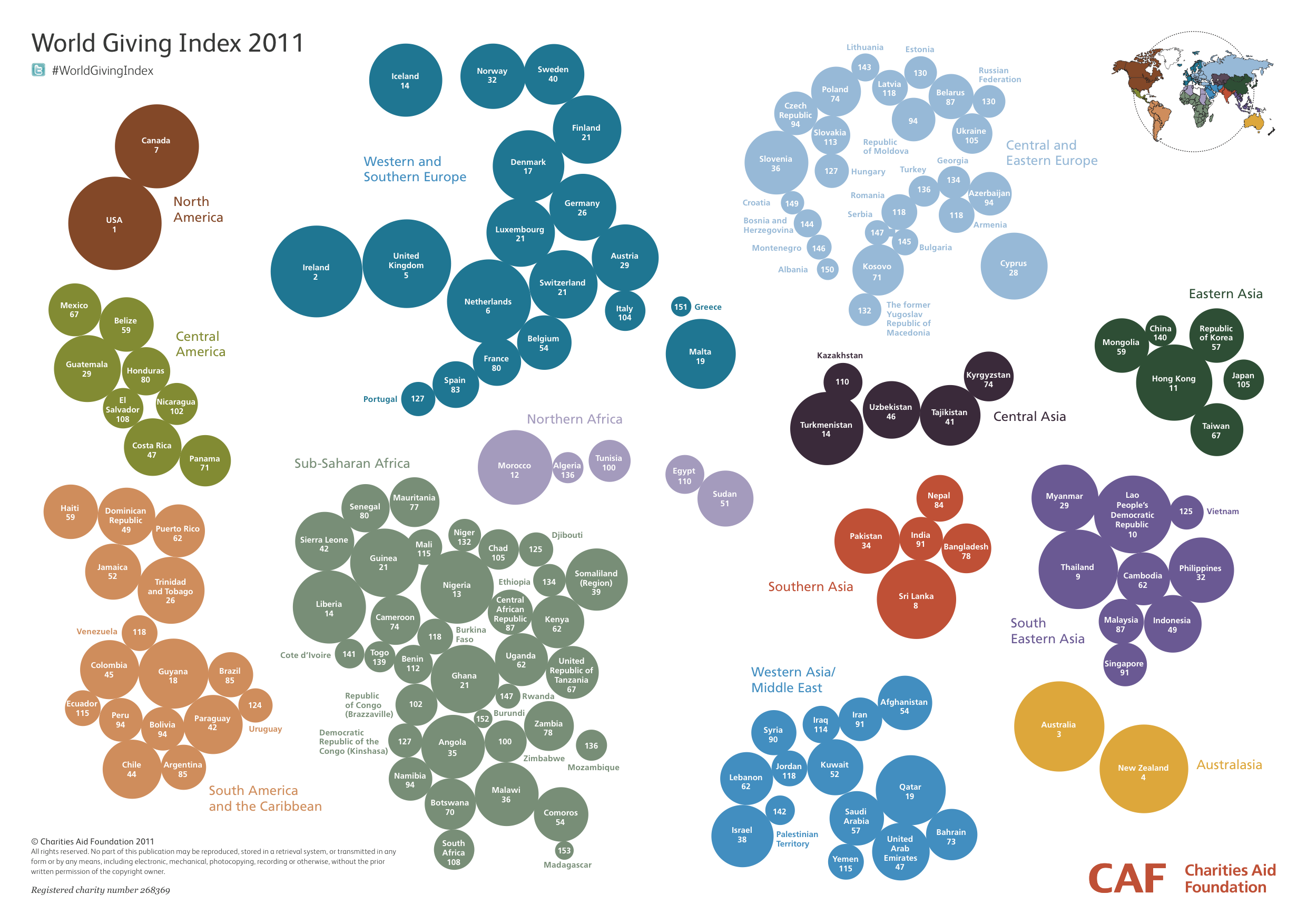The World Giving Index, which is the largest study of charitable behavior across the globe, demonstrates that the world has become a more charitable place over the last 12 months – with a 2% increase in the global population ‘helping a stranger’ and a 1% increase in people volunteering.
 (Map above shows global rankings and regional comparisons – Click to enlarge.)
(Map above shows global rankings and regional comparisons – Click to enlarge.)
While more of the global population has been giving up time to help others, the worldwide financial turmoil is almost certainly to blame for the fact that 1% fewer people have given money to a charity than in 2010.
The report – which is compiled by the UK based Charities Aid Foundation, uses Gallup polling information on the charitable behavior of people in 153 nations – is based on three measures. These are ‘giving money’, ‘volunteering time’ and ‘helping a stranger’. The global average of the three giving behaviors in 2011 was 32.4%, compared to 31.6% in 2010.
According to the study, the United States is only the 10th most generous nation globally in monetary terms, but combined with high rankings in other areas such as volunteering (5th) and helping strangers (2nd) the total score put the US at the top in terms of overall generosity. Last year the US was ranked number 5, worldwide.
Behind the US, the most generous nation overall in 2011 were (in order) Ireland, Australia, New Zealand, the United Kingdom, the Netherlands, Canada, Sri Lanka, Thailand and Laos. Meanwhile, the country ranked as the least charitable nation on earth is Madagascar.

According to the study, the most commonplace giving behavior globally in 2011 has been ‘helping a stranger’. Almost half the global population (47%) helps a stranger in a typical month. In comparison, fewer than three out of ten people ‘give money to charity’ (29%) or ‘volunteer time’ (21%) each month.
According to the study, giving money to charity is growing faster among the oldest age groups. Helping strangers meanwhile is becoming more common among those of middle age.
The report shows key differences in the charitable behaviors of the sexes. Thirty per cent of females have given money to charity each month compared with 29% of males.
However, 48% of males have ‘helped a stranger’ each month compared to 46% of females – and 22% of males have ‘volunteered time’ every month compared with 19% of females.
The highest-ranked country for ‘helping a stranger’ is Liberia, with 81% of the population giving in this way each month. The USA is second, with 73%, and Ghana and Sierra Leone are jointly third, with 72%.
Turkmenistan is the country with the highest percentage of the population ‘volunteering time’, with 61% doing so per month. Second is Liberia, 48%, and third is Sri Lanka, 46%.
By far the largest increase in the percentage of population ‘giving money’ is in Asia, with an increase of 9% in South Eastern Asia and an increase of 10% in Southern Asia.
The report shows that the worldwide increase in inclination to ‘help a stranger’ is in part due to a surge in the prevalence of this behaviour in Asia – with the four Asian regions seeing increases in the percentages of their populations ‘helping a stranger’ ranging from between 4-16%.
The Gallup opinion polls, used as the basis for the World Giving Index, asked over 150,000 people – representing 95% of the global population – whether they had given money to charity, volunteered time or helped a stranger in the last month. Using information from these interviews, the World Giving Index combines the levels of each charitable behavior to produce a ranking of the most charitable nations in the world.
CAF is an international UK registered charity. Its mission is to motivate society to give ever more effectively, and help transform lives and communities around the world. It advises on and distributes charitable funds around the world and has offices in nine countries: UK, America, Brazil, Russia, India, Australia, Singapore, South Africa and Bulgaria.
Download the full report and map here.
